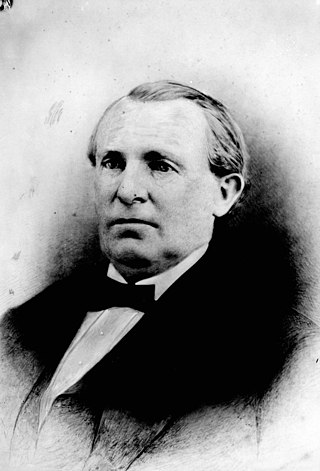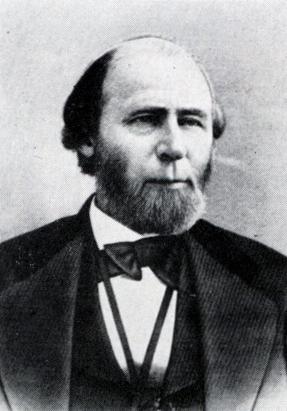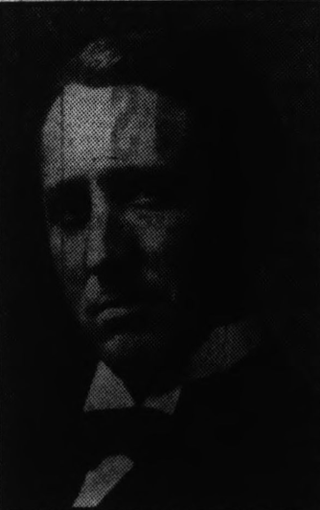Related Research Articles

William Bradley Umstead was an American politician who served as a United States Senator and the 63rd governor of North Carolina from 1953 to 1954.

William Walton Kitchin was an American attorney and the 52nd governor of the U.S. state of North Carolina from 1909 to 1913.

Curtis Hooks Brogden was an American farmer, attorney and politician who served as the 42nd governor of the U.S. state of North Carolina from 1874 to 1877 during the Reconstruction era. He succeeded to the position after the death of Governor Tod R. Caldwell, after having been elected as the 2nd lieutenant governor of the state on the Republican ticket in 1872.

William Woods Holden was an American politician who served as the 38th and 40th governor of North Carolina. He was appointed by President Andrew Johnson in 1865 for a brief term and then elected in 1868. He served until 1871 and was the leader of the state's Republican Party during the Reconstruction Era.

Jonathan Worth was the 39th governor of the U.S. state of North Carolina from 1865 to 1868, during the early years of Reconstruction.

Thomas Bragg was an American politician and lawyer who served as the 34th Governor of the U.S. state of North Carolina from 1855 through 1859. During the Civil War, he served in the Confederate States Cabinet. He was the older brother of General Braxton Bragg. They were direct descendants of Thomas Bragg (1579–1665) who was born in England and settled in the Virginia Colony.

William Alexander Graham was a United States senator from North Carolina from 1840 to 1843, a senator later in the Confederate States Senate from 1864 to 1865, the 30th governor of North Carolina from 1845 to 1849 and U.S. secretary of the Navy from 1850 to 1852, under President Millard Fillmore. He was the Whig Party nominee for vice-president in 1852 on a ticket with General Winfield Scott.

Walter Quintin Gresham was an American attorney, jurist, statesman, and politician who served in the cabinets of presidents Chester A. Arthur and Grover Cleveland.
More than 1,500 African American officeholders served during the Reconstruction era (1865–1877) and in the years after Reconstruction before white supremacy, disenfranchisement, and the Democratic Party fully reasserted control in Southern states. Historian Canter Brown Jr. noted that in some states, such as Florida, the highest number of African Americans were elected or appointed to offices after the end of Reconstruction in 1877. The following is a partial list of notable African American officeholders from the end of the Civil War until before 1900. Dates listed are the year that a term states or the range of years served if multiple terms.

The president pro tempore of the North Carolina Senate is the highest-ranking officer of one house of the North Carolina General Assembly. The president of the Senate is the Lieutenant Governor of North Carolina, but the president pro tempore actually holds most of the power and presides in the absence of the Lt. Governor. The president pro tempore, a senior member of the party with a majority of seats, appoints senators to committees and also appoints certain members of state boards and commissions. From 1777 to 1868, North Carolina had no Lieutenant Governor, and the highest-ranking officer of the Senate was known as the "Speaker". The Speaker of the Senate was next in line if the office of Governor became vacant. This occurred on two occasions.

The speaker of the North Carolina House of Representatives is the presiding officer of one of the houses of the North Carolina General Assembly. The speaker is elected by the members of the house when they first convene for their regular session, which is currently in January of each odd-numbered year. Perhaps the most important duty of the speaker is to appoint members and chairs of the various standing committees of the House.
Joseph W. Holden was a North Carolina politician in the nineteenth century. He was the son of William Woods Holden.
James Henry Harris was an American civil rights advocate, upholsterer, and politician. Born into slavery, he was freed as a young adult and worked as a carpenter's apprentice and worker before he went to Oberlin College in Ohio. For a time, he lived in Chatham, Ontario, where he was a member of the Chatham Vigilance Committee that aimed to prevent blacks being transported out of Canada and sold as slaves in the United States.
The Kirk–Holden war was a police operation taken against the white supremacist organization Ku Klux Klan by the government in the state of North Carolina in the United States in 1870. The Klan was using murder and intimidation to prevent recently freed slaves and members of the Republican Party from exercising their right to vote in the aftermath of the American Civil War. Following an increase in Klan activity in North Carolina—including the murder of a black town commissioner in Alamance County and the murder of a Republican state senator in Caswell County—Republican Governor of North Carolina William W. Holden declared both areas to be in a state of insurrection. In accordance with the Shoffner Act, Holden ordered a militia be raised to restore order in the counties and arrest Klansmen suspected of violence. This resulted in the creation of the 1st and 2nd North Carolina Troops, which Holden placed under the overall command of Colonel George Washington Kirk.

Thomas Settle was a United States Envoy Extraordinary and Minister Plenipotentiary to Peru, an associate justice of the Supreme Court of North Carolina and a United States district judge of the United States District Court for the Northern District of Florida.
The 1868-1869 North Carolina railroad bonds scandal took place in the U.S. state of North Carolina after Milton S. Littlefield and George W. Swepson defrauded North Carolina of $4 million by issuing fraudulent bonds for a railroad project.
Charles Morton Webb was an American lawyer, Republican politician, and Wisconsin pioneer. He was a Wisconsin circuit court judge for 28 years in central Wisconsin. Earlier in his career, he served as United States Attorney for the Western District of Wisconsin, appointed by Ulysses S. Grant, and served in the Wisconsin Senate during the 1869, 1870, and 1883 sessions.

Herbert Floyd Seawell was a North Carolina lawyer and politician who served as the United States Attorney for the Eastern District of North Carolina from 1910 to 1914, and judge of the United States Board of Tax Appeals from 1929 to 1936.

The North Carolina General Assembly of 1868–1869 met in Raleigh from November 16, 1868, to April 12, 1869, with a special session from July 1, 1868, to August 24, 1868. This was the first assembly to meet after the approval of the new Constitution of North Carolina in 1868. As prescribed in this constitution, the assembly consisted of the 120 members in the North Carolina House of Representatives and 43 senators in the North Carolina Senate elected by the voters on August 6, 1868. This assembly was in control of the Republican Party and was dominated by reconstruction era politics.
References
- ↑ History of the University of North Carolina, Volume II
- ↑ NC Manual of 1913
- ↑ Trial of William W. Holden
- ↑ Raper 1985, p. 293.
- ↑ North Carolina Manual 2011, p. 197.
- ↑ Journal of the Executive Proceedings of the Senate of the United States, p. 302 and p. 364.
- ↑ "Obituary and Card of Thanks Written in 1864", Statesville Record And Landmark (August 20, 1928), p. 2.
- ↑ "North Carolina", Murfreesboro Index (April 27, 1888), p. 1.
- ↑ "Died", The Raleigh News and Observer (March 13, 1895), p. 8.